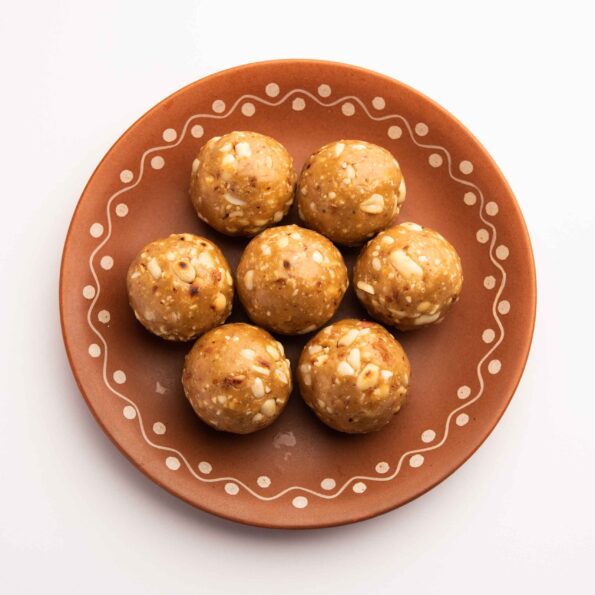Pori vilangai | Porul vilanga | Healthy Multigrain ladoo Recipe

History and Origin of Porivilangai Urundai
Porivilangai Urundai, also known as Porulvilanga Urundai, is a traditional sweet from South India, particularly popular in Tamil Nadu. This healthy snack has been a part of Tamil cuisine for centuries and is often associated with special occasions, festivals, and baby showers. The name "Porivilangai" derives from the Tamil words: “Porul” (meaning "ingredients") and “Vilanga” (meaning "cannot be identified"), as the ingredients blend together in a way that makes it hard to tell what’s in the sweet when you taste it.
This sweet is known for its hard texture, and in earlier times, it was often made in large balls and sent to pregnant women by their mothers as a nutritious treat. It is also a popular offering during religious and cultural events, symbolizing strength and nourishment due to its rich ingredients like dals, jaggery, and dry ginger.
Benefits of Porivilangai Urundai
- Rich in Protein and Fiber:
- The combination of roasted rice, wheat, moong dal, and channa dal provides a high amount of protein and fiber, promoting muscle health and aiding digestion.
- Good for Digestion:
- The inclusion of dry ginger (sukku) helps in improving digestion, reducing inflammation, and soothing an upset stomach.
- Natural Sweetener:
- Jaggery is a healthier alternative to refined sugar. It’s rich in iron, minerals, and antioxidants, providing energy and helping in detoxification.
- Boosts Immunity:
- The spices like ginger and cardamom, along with jaggery, are known to boost immunity and help fight against colds and other illnesses.
- Energy-Packed:
- Porivilangai Urundai is packed with nutrients, making it an excellent source of energy, especially for pregnant women, children, and those recovering from illness.
- No Refined Sugar:
- This sweet uses jaggery instead of processed sugar, making it a healthier option for those looking to avoid refined sugar.
- Long Shelf Life:
- Due to its dry and hard texture, Porivilangai Urundai has a long shelf life, making it easy to store and consume over time.
This traditional sweet is not just delicious but also incredibly nutritious, making it a perfect snack for all ages.
Porulvilanga Urundai is a traditional multigrain sweet made with dals, jaggery, dry ginger and no ghee.
- 1 cup Raw rice (Pacharisi)
- 1/2 cup Samba wheat (Dalia)
- 1/2 cup Moong dal
- 1/2 cup Channa dal
- 2 tbsp Coconut (grated)
- 1 tsp Dry ginger powder (Sukku)
- 2 pinches Cardamom powder (for 1/2 cup flour)
- 1/2 cup Jaggery (for 1/2 cup flour)
- 1/2 cup Groundnut (Roasted)
- In a pan, dry roast the raw rice on low flame until it turns a reddish-brown color. Stir continuously to prevent burning.
- Once done, set it aside.
- Next, add the samba wheat to the pan and roast well, making sure it doesn’t burn. You can also use whole wheat instead of samba wheat.
- Set it aside when done.
- Add the yellow moong dal to the pan and roast until it turns golden brown. You can replace moong dal with whole green gram if preferred.
- Set it aside.
- Finally, add the channa dal and roast it on low flame until it reaches a perfect golden-brown color.
- Always roast on low flame to avoid burning, stirring continuously.
- If you have access to a flour mill, grind all the roasted ingredients into a fine powder.
- If using a mixie, grind, sieve, and re-grind until you achieve a smooth texture.
- The ingredients will yield approximately 3 cups of flour. Take 1/2 cup for making this batch of urundai.
- In a pan, dry roast fresh grated coconut until the moisture evaporates and it turns golden brown. Do this on a low flame.
- Alternatively, if using dry coconut (kopra), just sauté it for a few seconds. Grate it using a small grater before adding.
Roast the Groundnut and Keep it aside
- In a pan, add 1/2 cup of powdered jaggery and 1/4 cup of water. Melt the jaggery and strain it to remove impurities.
- Return the jaggery to the pan, add sukku (dry ginger) powder and cardamom powder, and boil the syrup until it reaches soft ball consistency.
- To check the soft ball stage, drop a few drops of the syrup into a bowl of water. If you can gather it into a soft ball, it’s ready.
- Avoid reaching the hard ball stage, as it will make the urundai difficult to bite.
Once the jaggery syrup is ready, quickly pour it into the roasted flour and coconut mixture. Add the roasted groundnuts to the mixture
- Mix everything thoroughly using a spoon while the mixture is still warm.
- While the mixture is warm, start forming balls (urundais) using your hands. Be quick, as it becomes hard to shape the balls once the mixture cools.
- Your Porivilangai Urundais are now ready to enjoy! Perfect for snacking or sharing with family.
- Always make this recipe in small batches.
- You can add roasted peanuts or almonds to the mixture when making the flour for extra flavor.
- Instead of rice, you can use millet.
- You can also use sathu maavu (multigrain flour) to make this recipe.
- Some people roll the ladoos in dry flour after making them, especially if they feel moist. You can try this if needed.




